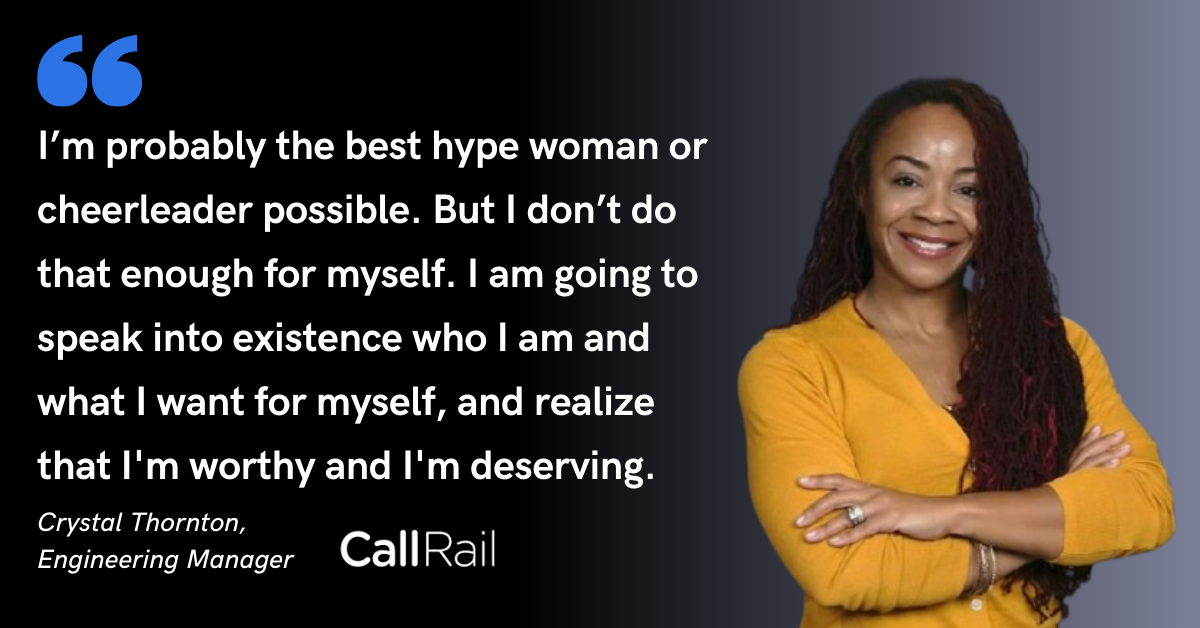Crystal Thornton has long mastered the perfect chocolate cake, but that doesn't keep her from trying out new recipes. She's currently working on making edible glass structures out of isomalt sugar.
She's always been one to take on new challenges, whether in the kitchen or in life. She usually succeeds at them, too—and often goes above and beyond. Like when she set out to run a 5k and ended up completing five marathons. Or when she entered her first bodybuilding Figure competition.
But like 75% of women in leadership who told KPMG that they experienced feelings of inadequacy and self-doubt in their careers, Crystal has struggled with imposter syndrome despite her many professional successes.
"I'm probably the best hype woman or cheerleader possible," says the engineering manager at call tracking software company CallRail. "But I don't do that enough for myself." Even her husband, she says, has noted that she always under-credits her accomplishments, from successful bakes to big promotions.
Over the last few years, Crystal has made a point of addressing that imposter syndrome. "I am going to speak into existence who I am and what I want for myself, and realize that I'm worthy and I'm deserving," she says of her new approach to her worth.
We sat down with Crystal to learn how she's come to recognize and address those feelings of doubt, as well as how she's working to pay that recognition forward by creating an environment for her team where everyone feels supported and welcome.
Building a career and navigating toxicity
Crystal first thought she wanted to be a teacher, like her mom, and studied English and African-American Studies to prepare for that career. When she graduated, though, she was more inspired by communication outside of the classroom, so she started working as a technical writer.
While she was good at the work, Crystal says she struggled with the culture. "I was in a predominantly white environment; I was the only Black woman there," she says. "I was in a junior role, trying to figure out the lay of the land, and I just did not have the support that I needed." Crystal now identifies that manager as the first person who made her feel "less than" at work. "No matter what I did, I just didn't feel like I could do anything to get into the good graces of my manager. It was very toxic and I could not figure out why I always felt so small after work each day."
She wanted to leave that role, but she felt like she needed more experience under her belt first, so she stuck with it for two years before becoming a QA analyst.
She quickly proved her talent in that space, becoming a test lead and then a senior QA engineer, but she still had a hard time owning her success. She was doing a teambuilding exercise and couldn't think of a response to the prompt "What's something you're proud of?" when she first realized she was belittling her own accomplishments.
It wasn't until Crystal was at CallRail and had what she calls a "truly great manager" that she started to see herself differently. "He always encouraged me, listened to my ideas, and pretty much let me run my career. He gave me a lot of open space to figure out what I wanted to do, and to make my own mistakes as well," she says. "It got to the point where I would pinch myself, like I cannot believe that I am finally somewhere where I am happy and can grow with the best manager."
When she was considering taking a promotion to become a QA manager at CallRail, he supported her—and helped her feel confident enough to apply for the promotion beyond that one, too.
Leaning in, with help
Crystal was listening to a presentation by CallRail's VP of Engineering when she heard him say they were looking to hire an engineering manager and that those in QA were welcome to apply.
"My ears perked up," she says, "but I thought, 'He's just saying that so we won't feel left out. I have no coding experience whatsoever, why would they want me to be an engineering manager?'"
The VP's encouragement to apply wasn't enough to crack the imposter syndrome that Crystal was still dealing with.
But then her manager checked in and told her she should go for it. "If he hadn't pushed me a little bit, I know that I would not have even thought about applying for the engineering manager role," says Crystal.
And then her good friend gave her a speech about why she needed to apply: "'You can do this. You're already doing this. You will be a great engineering manager. Stop talking yourself down. You will be awesome,'" remembers Crystal.
And that did it.
She applied and was offered the position, and even then, it took several days for it to sink in that she was about to make a big move in her career.
That was the moment she decided to face her imposter syndrome head-on. She realized there were two stages to dealing with it: first, leaning into the support of the people around her who believed in her. And second, remembering to believe in herself. "The question I ask is, 'Why NOT me?'" says Crystal.
"For the longest time, I felt pressure to not fail. I felt that I had to work extra hard to prove myself, and to prove that I belonged. At the time when I started my career in the tech industry, I did not see a lot of people that looked like me. I didn't have a community to lean into for support, which is why I love to see all of the new groups that have been formed, like Technologists of Color, for example."
Now, as an engineering manager, Crystal is working to pay that forward.
"That support goes a long way, 'cause a lot of us don't have that support," she says. "I don't take that for granted. My goal is to be that same support for someone else. Navigating in this industry, well really, life, I have learned to not only advocate for others, but to advocate for myself. For a long time I could not find my voice so I didn't use it. After a while, I found out just how much of a disservice it was to my growth in my career. How can I expect to help others if I can't speak up for myself?"
Enabling happiness, and 3 ways to support that
As a manager, Crystal knows that all of her team members will be different. As such, she works to create an environment where everyone can thrive, understanding that what works for one person won't work for another. That's part of why she chose a career at CallRail in the first place, and she wants to contribute to building the culture that has been so welcoming to her.
"I was consulting with a company where I had to travel five days a week, and I decided that the next company I went to had to have work-life balance and great benefits," she says. "That's how I ended up at CallRail. I needed to feel happy, whole, and accomplished."
There are a few things Crystal has identified that are important not just for individual managers to do but for companies to enable at scale in order to foster an inclusive culture that works for everyone:
- Be intentionally inclusive. "Make it known that you're trying to include everyone in some way," says Crystal. "Everybody's career path is going to be different. Everybody's walk of life is going to be different." At CallRail, for example, Crystal points to the top-down focus on diversity and inclusion, sponsorship of ERGs for people of color, and mentorship programs.
- Encourage feedback and really listen to it. "Even as a leader, I might not know what's going on," says Crystal. "I depend on the people who report to me to tell me what's going on so I can fix any issues." This means going beyond anonymous surveys, she says, and really showing employees that you're making changes that impact them for the better.
- Create safe spaces through communication and a focus on personal growth. "People need to feel like they're able to come to work and be comfortable and accepted," she says, highlighting how truly important that was throughout the last year of economic uncertainty and a racial reckoning.
Vulnerability in the present
One of Crystal's managerial superpowers is that she is just as comfortable with what she doesn't know as she is with what she does. "When I found out I was going to be a manager for some really smart people, I was like, 'Oh, gosh, that guy could probably create an app on the fly, I can't do that!'" she says. "But then I said, 'Crystal, that's not your job. You're not supposed to code. You're not supposed to solve the outage issue. Your job is to support your team and provide guidance for their careers. You are there to be their person and advocate for them.'"
And now, while her imposter syndrome does pop up every once in a while, Crystal knows how to stay focused on all her accomplishments that have brought her to this present moment, without worrying if she deserves to be there or what's next.
"I'm enjoying being an engineering manager," she says. "I'm growing. And if I'm thinking about a five-year plan, I am going to miss out on some great times. I'm going to start overthinking. I'm going to create problems that haven't even occurred yet. And I just don't need that type of negativity in my life. That's just my rule in general right now."
"I mean, if I learned anything last year," she adds, "it's that plans often don't go according to plan! Take it day by day, week by week, and month by month. Really take time to appreciate life!"




